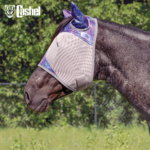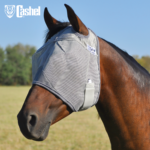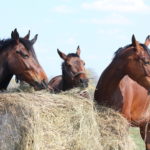Horses with chronic obstructive pulmonary disease, usually called COPD or “heaves,” require strict management to control the disease to a level in which the horse is still useful and comfortable.
A variety of inhaled potential allergens and irritants are found in dusty feeds and hays. These allergy triggers can include proteins or complex carbohydrates in specific types/species of hay or grains, other feed ingredients, molds/fungi, bacterial products, pollens, insect droppings and tiny insect body parts.
Anyone who has one of these horses knows to avoid these noticeably irritating feeds — even whole oats can be too dusty — but even low levels of allergens and irritants can irritate a horse with sensitive airways and lungs. Fine particles of hay, grain and dirt can be mechanical irritants.
To see how dusty your horse’s diet really is, take a sample of the plain or pelleted feed or hay and put it in plastic sandwich bag. Shake or stir it around well. The small particulate matter will adhere to the sides of the bag. In most cases you’ll be able to clearly see it. If you’re not sure, swab the inside of the bag with a cotton ball to see how much debris you pick up. Your best bets for minimizing aerosolized allergens/irritants include:
• Use cubed or pelleted hay rather than baled. Even these can benefit from being lightly moistened
• If feeding baled hay, dunk/soak each flake thoroughly, wetting it to the center and then shaking it apart.
• Sweet feed has the least potential for aerosolized particles, but don’t feed the fine material at the bottom of the bag or bin.
• Pellets have less dust than plain grains, but both should be moistened slightly with water or lightly sprayed with oil, before feeding.
• Plain grains can be further cleaned by shaking them in a colander with a fine mesh before feeding.
• Never feed broken grains or pellets at the bottom of a bag or bin, as there’s a high risk these could be mold-contaminated.
Beyond The Basics
Despite your aggressive efforts to keep feed irritants from making their way up the horse’s nose, some horses just don’t show improvement. The triggers may be unrelated factors such as pollution, ring dust, barn mold/dust, plant/tree allergens, permanent lung damage or the horse needing his medications or supplements adjusted. However, your horse can also be reacting to allergens he absorbs through his intestinal tract.
A variety of peptides (small proteins) and complex carbohydrates in grains, seeds, nuts, or legumes (like alfalfa and soy) have been known to worsen asthma symptoms in some people and experimental animals. This could also occur with your horse.
You can switch to a feed that doesn’t contain potential problematic ingredients in your current feed:
• Soy
• Wheat mids
• Alfalfa
• Seed meals
• Distiller’s dried grains.
However, finding a commercial feed that doesn’t contain one or more of these ingredients can be difficult to impossible. You may want to start with a strict simple diet of one ingredient. If that helps, then try adding things back in one at a time. Allow two weeks after each change to judge effects. Do not change medications or supplements during this time, and pick a time of year when you know your horse’s symptoms are typically fairly stable.
Bottom Line
Controlling these horses with supplements, techniques and therapies developed in recent research and drugs is a necessary step. However, the basic diet can’t be ignored.
Also With This Article
”Management Strategies”
”Thinning Mucus”
”Cleaning Buckets”






